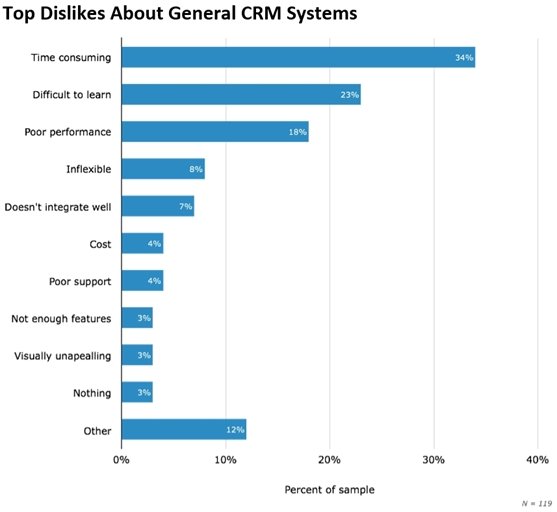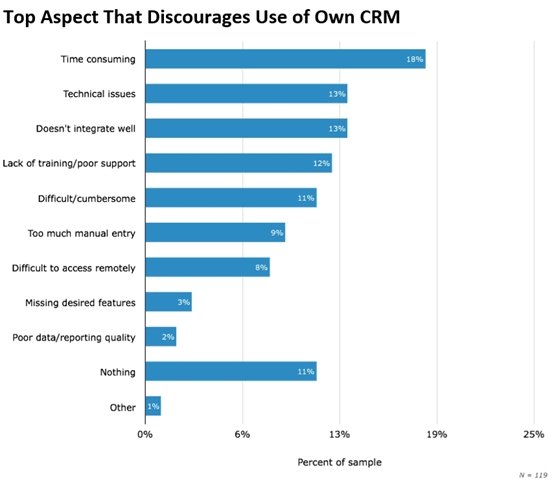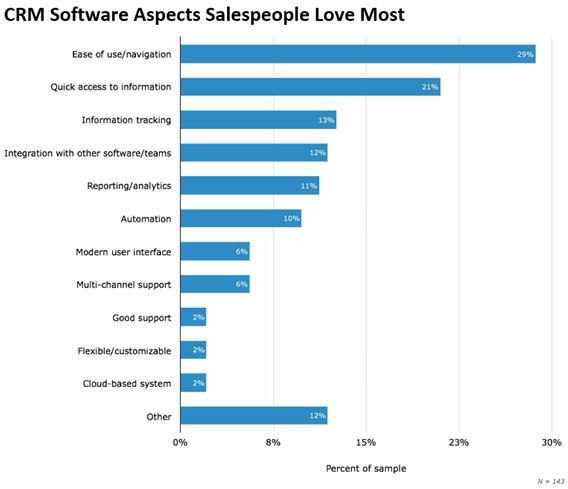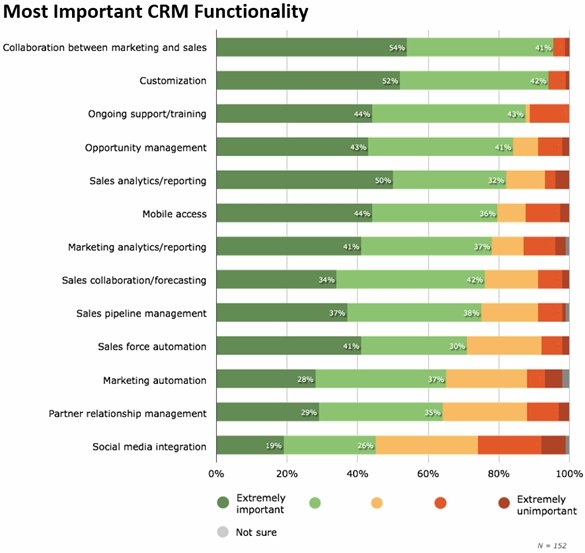Most salespeople don't like using customer relationship management (CRM) systems; ask any CRM expert, and they'll tell you the same.
Interacting with prospects is simply much more attractive than spending time and energy learning how to use difficult software or entering volumes of data—things that take away from time salespeople could spend, well, selling. But is there more to it?
At Software Advice, we speak with organizations that contact us looking for information on CRM software. So we wanted to find out exactly what salespeople don't like about their CRM systems and how businesses can choose a system their teams will actually use. We conducted a survey of 152 salespeople who are CRM software users, and for additional insight we spoke to Brent Leary, co-founder and partner of CRM Essentials LLC, a CRM advisory firm.
But before we go on to specific CRM systems your salespeople will enjoy using, let's first take a look at precisely what users don't like about them.
What Salespeople Don't Like
We began by asking salespeople what they generally dislike about CRM software. Then, we asked them what discourages them most from using their own system. (Respondents were filtered to only include those who aren't completely satisfied with their CRM system.)
In general, 34% of salespeople say CRM systems are just too time-consuming and take time away from managing customer relationships—rather than facilitating the process. Even worse, 18% say the time it takes to use their CRM system actively discourages them from using it.
Leary says the problem isn't so much with the technology itself, but that the software isn't always the right fit. Companies too often fail to learn their team's specific needs and most valued features before making a purchase. What's more, he says, managers don't always do a good job of explaining to salespeople the benefits of using the software, or offer proper training on how to use it. Naturally, frustration occurs.
"It's like buying a Porsche without having a driver's license," Leary explains. "It's a great car and it goes fast, but if you don't know how to drive it, the only thing you can do is get into an accident at a much faster (and probably deadlier) rate."
Still, there's hope: Though they may still have gripes, 11% of salespeople say there isn't anything that actively discourages them from using their CRM software. Some may simply accept their challenges as par for the course when using software, and so they forge ahead. For others, CRM use may be mandatory—and so they comply, despite their frustration.
Alternatively, some companies may choose the right CRM software from the start, and provide the right type—and mix—of training and support that staves off CRM rejection.
What Salespeople Do Like
The bottom line is this: Although the CRM software market is rife with excellent options, they're not one-size-fits-all solutions. It is possible to find a CRM system that salespeople find appealing, and knowing your team's wants and needs makes it easier to find the best fit.
As with virtually any type of software, CRM systems require time to learn and use—there's no getting around that. However, some systems require less time to use than others, and many offer additional benefits that outweigh the effort.
For instance, 29% of survey respondents love that their CRM system is easy to use and offers intuitive navigation. Clearly, though the system may still require an investment of users' time, that time doesn't have to be painful.
Another 21% of salespeople say they like the quick access to information that CRM systems provide. Whatever time is spent entering data, the ability to quickly navigate to that information when it's needed ultimately translates into a better user experience and more efficient workflow. And the more efficient salespeople can be, the more deals they can close.
We also asked salespeople about what specific functionality they value most in a CRM system:
Considering all those findings, along with what we know salespeople like and dislike most about CRM software, businesses should have in mind seven top criteria when evaluating a new CRM system. The system should...
- Be intuitive, with a simple interface that's easy to learn and use
- Be customizable, with flexible options for how users can display and manage information
- Be able to integrate, so it works seamlessly with email, social media, and other platforms
- Be easily accessible, so the system can be used anywhere, from any device
- Enable collaboration between Marketing and Sales, to align activities across departments
- Offer reliable analytics and reporting, to help with strategic decision-making
- Include support and training, plus resources to help with initial ramp-up and technical issues
Based on those criteria and our survey data, we've put together a list of five CRM systems we think your salespeople will actually use.
Next week: five CRM systems that combine most desired capabilities and functionality.








